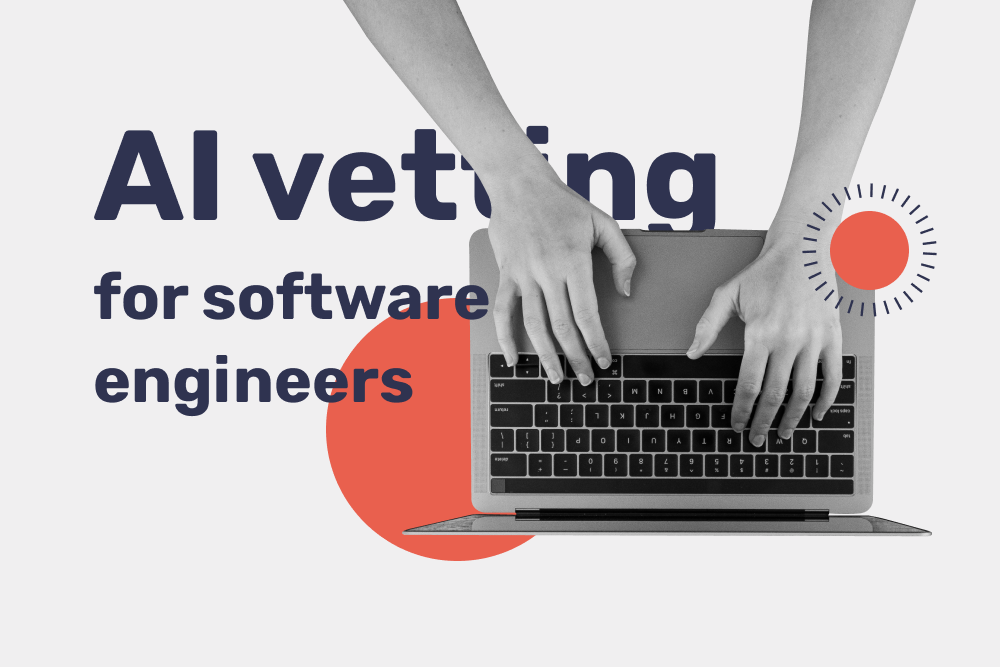Could you ever imagine there is a technology that can create content, translate texts, or write code with the mastery of a human? Sounds like something from a sci-fi movie, but that’s ChatGPT for you. An AI chatbot that took the world by the storm and got 1 million users five days after its launch in November 2022 continues to dominate, making many people anxious about whether machines will replace them in the near future.
As a talent sourcing agency, our team was curious to learn whether ChatGPT can replace humans once and for all. After spending some time with it, we can say that the bot can’t replace human sourcers (for now). Still, ChatGPT turned out to be a very handy tool to help you automate certain tasks and optimize your resources.
To understand how helpful ChatGPT might be in the talent acquisition process and whether you need it, let’s discover ways you can integrate it into the recruitment process and streamline talent acquisition.
Why use ChatGPT for tech talent hiring?
Now, why don’t we ask ChatGPT itself? Here’s what it answered. Looks pretty compelling, if you ask.

Anyway, let’s come back to the human side. With numerous stages involved, including sourcing, candidate screening, interviews, and more, recruitment is a tedious process that takes much effort and resources, especially for large corporations that have many positions to fill. Therefore, an AI-powered tech assistant like ChatGPT comes to the rescue by transforming the speed and quality of talent recruitment and hiring. Let’s see what benefits you get when using Chat GPT for hiring tech talent.
Increase efficiency of the hiring process
With ChatGPT, recruiters can make better hiring decisions, and, optimize the recruitment process overall. AI algorithms can be used to evaluate candidates’ skills, as well as screen and shortlist candidates based on specific criteria. Analyzing candidates’ qualifications, ChatGPT can provide valuable insights that help find a perfect match for your position.
Save time and costs
ChatGPT can help you automate repetitive recruitment tasks and significantly speed up the hiring process, letting your HR managers focus on activities that require human interventions, like communication with candidates. The tool can also assist in creating job descriptions, writing outreach email templates, job ads, and so on, helping you optimize your resources as a result.
Reduce bias
When evaluating candidates, recruiters might have unintentional bias based on the candidate’s gender, age, or nationality without even noticing it. Designed to be objective, ChatGPT helps reduce bias, assessing candidates based on their skills and qualifications.
Now, let’s move on to the ways you can use ChatGPT for hiring talent.
5 ways to use ChatGPT in tech talent recruitment
Although ChatGPT wasn’t designed specifically for recruitment purposes, it offers a wide range of capabilities to attract, assess, and retain tech talent. Let’s see how you can utilize ChatGPT in recruitment.
Assess candidates
Working with a huge talent pool, you can use ChatGPT to evaluate potential hires. For example, you can ask the bot to provide a summary of the candidate’s CV, listing their strengths and weaknesses and whether they fit the position.
As an example, we took a CV sample of a software tester and asked ChatGPT whether the candidate is suitable for a mobile development project. Here’s the response:

Create interview questions by role and interview type
ChatGPT might be used to generate a list of interview questions for a specific position. Mind that the more detailed your prompt is, the more accurate response you’ll get. For example, imagine you are looking for a Data Engineer having prior experience in Python projects. Let’s see what questions ChatGPT comes with.
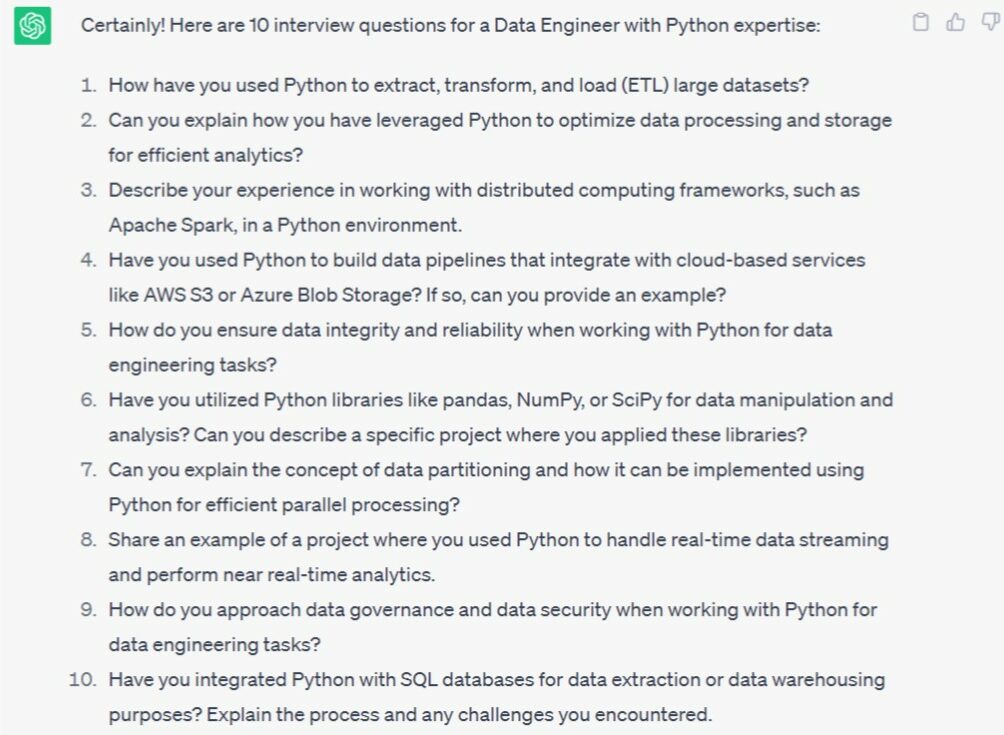
When you’re looking for another specialist, say, a project manager, you can specify your prompt and ask ChatGPT to generate five questions to interview a project manager focusing on soft skills.
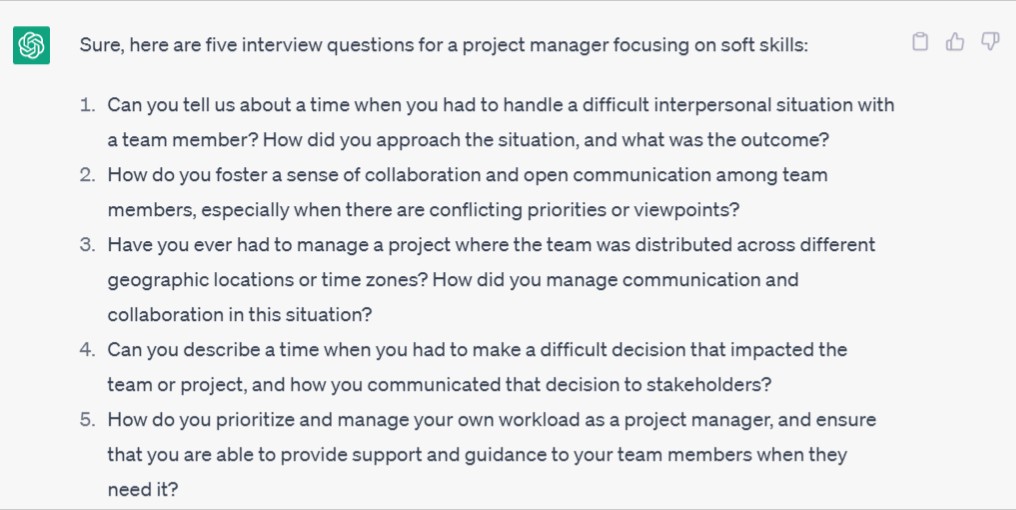
Write job descriptions
ChatGPT can assist in crafting a job description or improving the one you already have. But remember, when asking questions to ChatGPT, details matter, a lot. For example, when you’re looking to hire a Python developer with niche expertise, you should specify this expertise in your prompt.
For example, let’s ask ChatGPT to write a job description for a Senior Software Engineer with 5+ experience in Python and Agile expertise. Here’s the response.

Write emails and personalized responses
As a natural language processing model, ChatGPT can be of great help when reaching out to passive candidates, creating personalized rejection letters, answering frequently asked questions, and so on.
Let’s give a task to ChatGPT to write an outreach email to a software engineer. Respecting the candidate’s time, let’s also make it short and down to the point.
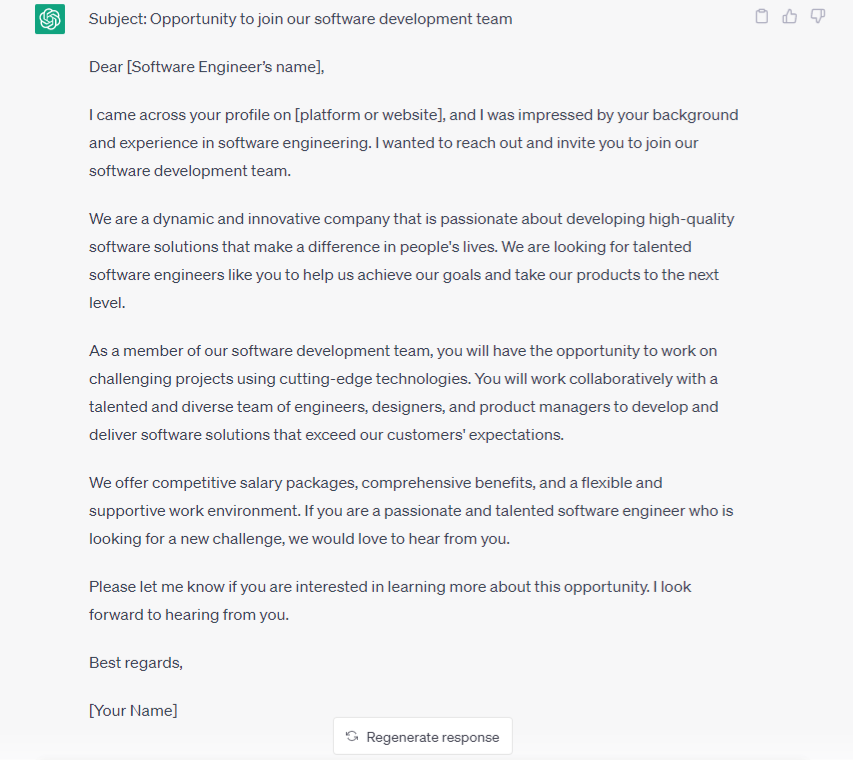
Conduct hiring market research
Apart from providing writing assistance, ChatGPT can help with analytics and data collection. For example, you can ask the bot about current hiring trends, provide some market insights, and more. This way you get valuable data that helps you improve decision-making.
To check how it works, let’s ask ChatGPT to analyze the current trends when it comes to hiring tech talent.
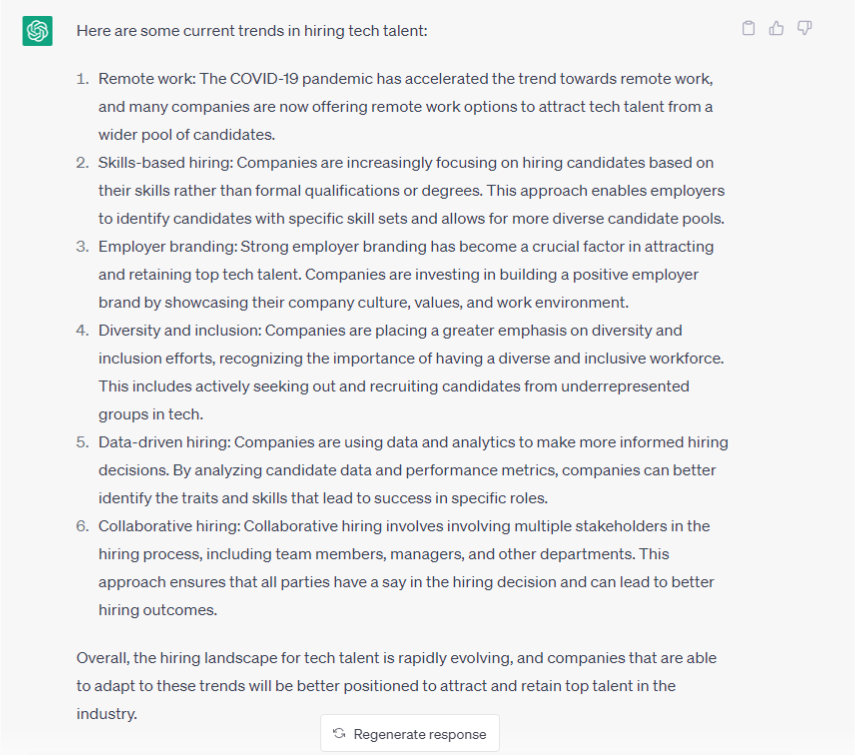
All in all, ChatGPT can save you a ton of time, but don’t rush to fully rely on it. Remember we said that ChatGPT can’t fully replace humans? Now it’s time to learn why.
Pitfalls when using ChatGPT for recruiting
Although ChatGPT might become a powerful tool for recruitment, there are also potential challenges you can face when implementing it in the hiring process.
Lack of human interaction
Being an automated tool, ChatGPT lacks the human touch and empathy. ChatGPT is good at assessing candidate’s hard skills, but the situation changes when it comes to soft skills. Neglecting the candidate’s soft skills can result in a poor hiring decision, which will eventually affect your project and result in additional costs. That is why we recommend hiring a talent expert to assess candidates from a human perspective.
At Bridge, we understand that professional engineers are not easy to come by, so we can’t afford our clients to lose skilled developers. That’s why our tech-savvy recruiters communicate with candidates in their native language, and assess them based on their work history, experience, technical skills, and interpersonal attribute.
Technical challenges
Due to the lack of technical knowledge and expertise, some companies might face challenges when implementing ChatGPT in their inner systems, like ATS. API integration, data formatting, performance optimization, and more ‒ these operations require experts in place, so make sure you have all the necessary resources, both human and technical, to successfully integrate GPT into your workflow.
If you feel like the game’s not worth the candle, follow a traditional way and partner with hiring experts like Bridge. We are a global recruitment company with local recruiters who understand the technology and cultural background of candidates. With our team of sourcers and client managers, we provide seamless, predictable, and scalable service to each client.
Privacy and security
As the hiring process involves sensitive candidate information, ensuring data privacy and security becomes crucial. So when you’re about to add ChatGPT into your applicant tracking system, make sure you have data security experts in your team to prevent potential leaks.
Conclusion
ChatGPT is not going to replace human recruiters any time soon, but it will definitely serve as their little helper. So when you’re looking to use ChatGPT for job search, recruitment, or any other purposes, make sure you have a team of experienced HR experts on board. And this is what Bridge is all about.
With or without ChatGPT, here at Bridge, we have a team of talented sourcers ready to help you with attracting top-notch software developers. Using our sourcing engine built specifically for engineer recruitment, our team can source candidates five times faster compared to traditional sourcing. What’s more, with our sourcing-as-a-service, you can get up to 30 pre-vetted candidates per month, while cutting down the costs.
Contact us and we will help you choose the type of recruitment services most suitable for your needs.


